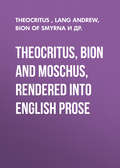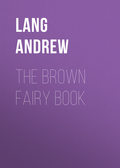
Lang Andrew
Tales of Romance
PART V
After his brothers had forsaken him Wayland went to bed lonely and sad; but the next morning he got up and looked at the three keys that the Noras had left behind them. One was of copper, one was of iron, and one was of gold.
Taking up the copper one, he walked to the mountain till he reached a flat wall of rock. He laid his key against it, and immediately the mountain flew open and showed a cave where everything was green. Green emeralds studded the rocks, green crystals hung from the ceiling or formed rows of pillars, even the copper which made the walls of the cave had a coating of green. Wayland broke off a huge projecting lump and left the cave, which instantly closed up so that not a crack remained to tell where the opening had been.
He carried the lump home, and put it into the fire till all the earth and stones which clung to it were burned away; and then he fashioned the pure copper into a helmet, and in the front of the helmet he set three of his largest emeralds.
This occupied some days, and when it was done he took the iron key, and went to another mountain, and laid the key against the rock, which flew open like the other one. But now the walls were of iron, which shone like blue steel, while sapphires glittered in the midst.
Wayland gazed with wonder at all these things; then he broke off a piece of the iron, and carried it home with him.
For many days after he busied himself in forging a sword that was so supple he could wind it round his body, and so sharp it could cut through a rock as if it had been a stick. In the handle and in the sheath he set some of the finest sapphires that he had brought away with him.
When all was finished he laid the sword aside, and returned to the mountain, with the golden key. This time the mountain parted, and he saw before him an archway, with a glimpse of the sea in the distance.
Before the entrance roses were lying, and inside the golden walls sparkled with rubies, while branches of red coral filled every crevice. Vines climbed around the pillars, and bore large bunches of red grapes.
Wayland stood long, looking at these marvels; then he plucked some of the grapes, broke off a lump of gold, and set out home again.
Next day he began to make himself a golden breastplate, and in it he placed the jewels, and it was so bright that you could have seen the glitter a mile off.
After he had tried all the three keys, and found out the secrets of the mountain, Wayland felt dull. So his mind went back to his brothers, and he wondered how they had fared all this time.
The first thing he did was to go to the edge of the forest, and see if he could find the two footprints they had left.
He soon arrived at the spot where they had taken farewell of each other, but a blue pool of water covered the trace of Eigil's foot. He turned to look at the impression made by Slagfid, but on that fresh green grass had sprung up over it, and on a birch-tree near it a bird had perched, which sang a mournful song.
Then Wayland knew that his brothers were dead, and he returned to his hut, grieving sore.
PART VI
It was a long time before Wayland could bring himself to go out, so great was his sorrow; but at last he roused himself from his misery, and went to the mountain for more gold, meaning to work hard till the nine years should be over and he should get his wife back again.
All day long he stood in his forge, smelting and hammering, till he had made hundreds of suits of armour and thousands of swords, and his fame travelled far, so that all men spoke of his industry.
At last he grew tired of making armour, and hammered a number of gold rings, which he strung on strips of bark, and as he hammered he thought of Alvilda his wife, and how the rings would gleam on her arms when once she came back again.
Now at this time Nidud the Little reigned over Sweden, and was hated by his people, for he was vain and cowardly and had many other bad qualities. It came to his ears that away in the forests lived a man who was very rich, and worked all day long in pure gold.
The King was one of those people who could not bear to see anyone with things which he did not himself possess, and he began to make plans how to get hold of Wayland's wealth.
At length he called together his chief counsellors, and said to them: "I hear a man has come to my kingdom who is called Wayland, famous in many lands for his skill in sword-making. I have set men to inquire after him, and I have found that when first he came here he was poor and of no account, so he must have grown rich either by magic or else by violence. I command, therefore, that my stoutest men-at-arms should buckle on their iron breastplates and ride in the dead of night to Wayland's house, and seize his goods and his person."
"King Nidud," answered one of the courtiers, "that you should take himself and his goods is well, but why send a troop of soldiers against one man? If he is no sorcerer, then a single one of your soldiers could take him captive; but if, on the other hand, he is a magician, then a whole army could do nothing with him against his will."
At this reply the King flew in a rage, and, snatching up a sword, ran it through his counsellor's body; then, turning to the rest, told them that they would suffer the same fate if they refused to submit to his will.
So the men-at-arms put on all their armour, and, mounting their horses, set forth at sunset to Wayland's house, King Nidud riding at their head. The door stood wide open, and they entered quietly, in deadly fear lest Wayland should attack them.
But no one was inside, and they looked about, their eyes dazzled by the gold on the walls. The King gazed with wonder and delight at the long string of golden rings, and, slipping the finest off a strip of bark, placed it on his finger.
At that moment steps were heard in the outer court, and the King hastily desired his followers to hide themselves, and not to stir till he signed to them to do so.
In another moment Wayland stood in the doorway, carrying on his shoulders a bear which he had killed with his spear and was bringing home for supper.
He was both tired and hungry, for he had been hunting all day; but he had first to skin the animal, and make a bright fire, before he could cut off some steaks and cook them at the end of the spear. Then he poured some mead into a cup and drank, as he always did, to the memory of his brothers. After that he spread out his bear's skin to dry in the wind, and this done he stretched himself out on his bed and went to sleep.
PART VII
King Nidud waited till he thought all was safe, then crept forth with his men, who held heavy chains in their hands wherewith to chain the sleeping Wayland. But the task was harder than they expected, for he started up in wrath, asking why he should be treated so. "If you want my gold, take it and release me. It is useless fighting against such odds."
"I am no robber," said Nidud, "but I am your King."
"You do me much honour," replied Wayland, "but what have I done to be loaded with chains like this?"
"Wayland, I know you well," said Nidud. "Poor enough you were when you came from Finmark, and now your jewels are finer and your drinking cups heavier than mine."
"If I am indeed a thief," answered Wayland, "then you do well to load me with chains and lead me bound into your dungeons; but if not, I ask again, Why do you misuse me?"
"Riches do not come of themselves," said Nidud, "and if you are not a thief, then you must be a magician and must be watched."
"If I were a magician," answered Wayland, "it would be easy for me to burst these bonds. I know not that I have ever wronged any man, but if he can prove it, I will restore it to him tenfold. As to the gifts that may come from the gods, no man should grudge them to his fellow. Therefore release me, O King, and I will pay whatever ransom you may fix."
But Nidud only bade his guards take him away, and Wayland, seeing that resistance availed nothing, went with them quietly.
By the King's orders he was thrown into a dark hole fifteen fathoms under ground, and the soldiers then came and robbed the house of all its treasures, which they took to the Palace. The ring which Wayland had made for Alvilda, Nidud gave to his daughter, Banvilda.
One day the Queen was in her own room, when the King came in to ask her advice as to how best to deal with Wayland, as he did not think it wise to put him to death, for he hoped to make some profit out of his skill. "His heart will beat high," said the Queen, "when he sees his good sword, and beholds his ring on Banvilda's finger. But cut asunder the sinews of his strength, so that he can never more escape from us, and keep him a prisoner."
The King was pleased with the Queen's words, and sent soldiers to carry Wayland to a tower on an island. The sinews of his legs were cut so that he could not swim away; but they gave him his boots, and the chests of gold they had found in his house. Here he was left, with nothing to do from morning till night, but to make helmets and drinking cups and splendid armour for the King.
PART VIII
On this island Wayland remained for a whole year, chained to a stone and visited by no one but the King, who came from time to time to see how his prisoner was getting on with a suit of golden armour he had been ordered to make.
The shield was also of gold, and on it Wayland had beaten out a history of the gods and their great deeds. He was very miserable, for the hope of revenge which had kept him alive seemed as far off as ever in its fulfilment, and finding a sword he had lately forged lying close to his hand, he seized it, with the intent of putting an end to his wretched life.
He had hardly stretched out his hand, when a bird began to sing at the iron bars of his window, while the evening sun shone into his prison. "I should like to see the world once more," thought he, and, raising himself on the stone to which his chain was fastened, he was able to look at what lay beneath him.
The sea washed the base of the rock on which the tower was built, and on a neck of land a little way off some children were playing before the door of a hut. Everything was bathed in red light from the glow of the setting sun.
Wayland stood quite still on top of the stone, gazing at the scene with all his eyes, yet thinking of the land of his birth, which was so different. Then he looked again at the sea, which was already turning to steel, and in the distance he saw something moving on the waves.
As it came nearer he discovered it was a water sprite, singing a song which blended with the murmur of the waves and the notes of the bird. And the song put new life and courage into his heart, for it told him that if he would endure and await the pleasure of the gods, joy would be his one day.
The sprite finished her song, and smiled up at Wayland at the window before turning and swimming over the waves till she dived beneath them. That same instant the bird flew away, and the moon was covered by a cloud. But Wayland's heart was cheered, and when he lay down to rest he slept quietly.
Some days later the King paid another visit, and suddenly espied the three keys which had been hidden in a corner with some of Wayland's tools.
He at once asked Wayland what they were, and when he would not tell him the King grew so angry that, seizing an axe, he declared that he would put his prisoner to death unless he confessed all he knew. There was no help for it, and Wayland had to say how he came by them and what wonders they wrought. The King heard him with delight and went away, taking the keys with him.
PART IX
No time was lost in preparing for a journey to the mountains, and when the King reached the spot described by Wayland he divided his followers into three parties, sending two to await him some distance off, and keeping the third to enter the mountain with himself, if the copper key did the wonders it had done before.
So he gave it to one of the bravest of his men, and told him to lay it against the side of the mountain. The man obeyed, and instantly the mountain split from top to bottom.
The King bade them enter, never doubting that rich spoils awaited him; but instead, the men sank into a green marsh, which swallowed up many of them, while the rest were stung to death by the green serpents hanging from the roof. Those who, like the King, were near the entrance alone escaped.
As soon as he had recovered from the terror into which this adventure had thrown him, he commanded that it should be kept very secret from the other two parties, and desired Storbiorn his Chamberlain, to take the key of iron and the key of gold and deliver them to the leaders of the divisions he had left behind, with orders to try their fortune in different parts of the mountain.
"Give the keys to me, my lord King," answered Storbiorn, "and I shall know what to do with them. These magicians may do their worst, my heart will not beat one whit the faster; and I shall see all that happens."
So he went and gave his message to the two divisions, and one stayed behind while Storbiorn went to the mountain with the other.
When they arrived, the man who held the key laid it against the rock, which burst asunder, and half the men entered at Storbiorn's command.
Suddenly an icy blue stream poured upon them from the depths of the cavern, and drowned most of them before they had time to fly. Only those behind escaped, and Storbiorn bade them go instantly to the King and tell him what had happened.
Then he went to the third troop and marched with them to the rock, where he gave the golden key to one of the men, and ordered him to try it.
The rock flew open at once, and Storbiorn told the men to enter, taking care, however, to keep behind himself. They obeyed and found themselves in a lovely golden cave, whose walls were lit up by thousands of precious stones of every hue.
There was neither sight nor sound to frighten them, and even Storbiorn, when he saw the gold, forgot his prudence and his fears, and followed them in.
In a moment a red fire burst out with a terrific noise, and clouds of smoke poured over them, so that they fell down choked into the flames. Only one man escaped, and he ran back as fast as he could to the King to tell him of the fate of his army.
PART X
All this time Wayland was working quietly in his island prison, waiting for the day of his revenge. The suit of golden armour which the King had commanded kept him busy day and night, and, besides the wonderful shield with figures of the gods, he had wrought a coat of mail, a helmet, and armour for the thighs, such as never had been seen before.
The King had invited all his great nobles to meet him at the Palace, when he returned from the mountain, so that they might see his wonderful armour and all the precious things he should bring with him from the caverns.
When Nidud reached his Palace the Queen and Banvilda, their daughter, came forth to meet him, and told him that the great hall was already full of guests, expecting to see the wonders he had brought.
The King said little about his adventures, but went into the armoury to put on his armour in order to appear before his nobles. Piece by piece he fastened it, but he found the helmet so heavy that he could hardly bear it on his head. However, he did not look properly dressed without it, so he had to wear it, though it felt as if a whole mountain was pressing on his forehead. Then, buckling on the sword which Wayland had forged, he entered the hall, and seated himself on the throne.
The Earls were struck dumb by his splendour, and thought at first that it was a god, till they looked under the helmet and saw the ugly little man with the pale cowardly face. So they turned their eyes gladly on the Queen and Princess, both tall and beautiful and glittering with jewels, though inwardly they were not much better than the King.
A magnificent dinner made the nobles feel more at ease, and they begged the King to tell them what man was so skilled in smith's work. Now Nidud had drunk deeply, and longed to revenge himself on Wayland, whom he held to have caused the loss of his army; so he gave the key of the tower to one of his Earls, and bade him take two men and bring forth Wayland, adding that if the next time he visited the tower he should find a grain of gold missing, they should pay for it with their lives.
The three men got a boat, and rowed towards the tower, but on the way one who, like the King, had drunk too much fell into the sea and was drowned. The other two reached the tower in safety, and finding Wayland, blackened with dust, busy at his forge, bade him come just as he was to the boat.
With his hands bound they led him before the King, and said, "We have done your desire, Sir King, and must now hasten back to look for Grullorm, who fell into the sea".
"Leave him where he is," replied Nidud; "and in token of your obedience to my orders I will give you each these golden chains."
The guests had not thought to see the man who had made such wonderful armour helpless and a cripple, and said so to the King. "He was once handsome and stately enough," answered Nidud, "but I have bowed his stubborn head." And the Queen and her daughter laughed and said, "The maidens of Finmark will hardly fancy a lover who cannot stand upright".
But Wayland stood as if he heard nothing, till the King's son snatched a bone from the table and threw it at his head. Then his patience gave way, and, seizing the bone, he beat Nidud about the head with it till the helmet itself fell off.
The guests all took his side, and said that, though a cripple, he was braver than many men whose legs were straight, and begged the King to allow him to go back to his prison without being teased further.
But the King cried that Wayland had done mischief enough, and must now be punished, and told them the story of his visit to the mountain and the loss of his followers. "It would be a small punishment to put him to death," he said, "for to so wretched a cripple death would be welcome. He may use the gold that is left, but henceforth he shall only have one eye to work with," and the Princess came forward and carried out the cruel sentence herself. Wayland bore it all, saying nothing, but praying the gods to grant him vengeance.







